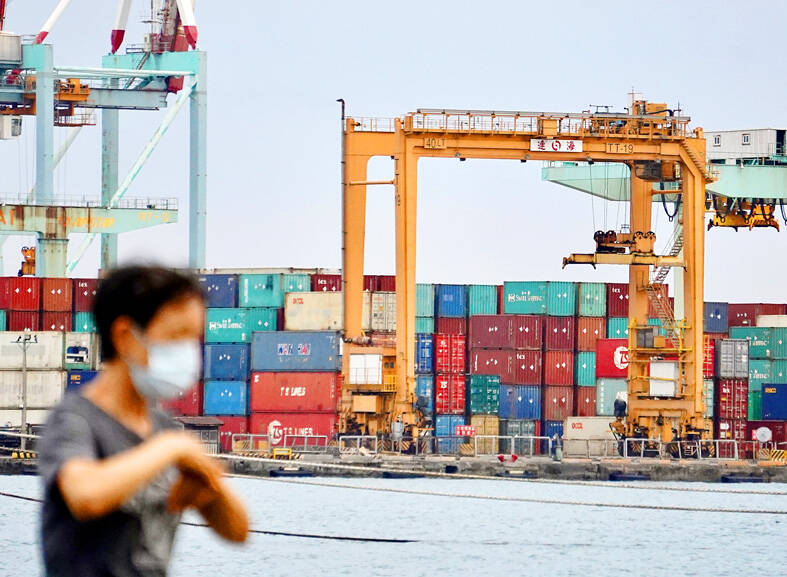The Directorate-General of Budget, Accounting and Statistics (DGBAS) yesterday trimmed its forecast for Taiwan’s GDP growth this year from 3.94 percent to 3.9 percent, saying it had previously overestimated the strength of exports.
The downward revision came after economic growth, which increased 6.63 percent in the first quarter, moderated to 5.06 percent in the second quarter.
“Despite the tweak, Taiwan’s economy remains on a course of stable growth that will extend into next year,” DGBAS Minister Chen Shu-tzu (陳淑姿) told a news conference in Taipei.

Photo: CNA
While demand for technology products remained strong on the back of the artificial intelligence boom, shipments of non-tech products weakened, resulting in an imbalanced recovery, Statistics Department head Tsai Yu-tai (蔡鈺泰) said.
Exports, the main component of the nation’s economy, are projected to expand 8.71 percent this year, down from the 10.06 percent the statistics agency predicted in May, after second-quarter results missed the target by 4.54 percentage points, the agency’s report showed.
China-bound exports in particular have taken a hit from China’s economic slowdown and the global electronics supply chain realignment, government data showed.
Manufacturers of plastic, chemical and petrochemical products were dealt an extra blow by cross-strait tensions and the termination of favorable trade terms.
Consequently, exports are forecast to increase 6.27 percent this quarter and 6.53 percent next quarter, down from the agency’s previous estimates of 7.02 percent and 6.73 percent respectively, Tsai said.
Suppliers of electronics used in AI development and applications posted robust earnings and are looking at continued improvement.
Taiwan Semiconductor Manufacturing Co (台積電) on Thursday said that it has signed an agreement with Innolux Corp (群創) to buy the display maker’s plant in Tainan for NT$17.14 billion (US$530.85 million) amid tight supply of its advanced packaging capacity.
That suggests private investment, another GDP component, would stage a faster rebound of 3.89 percent, up from 1.52 percent previously, which should help offset disappointing external demand, the DGBAS said.
At the same time, consumer spending would remain resilient, growing 2.78 percent this year, little changed from the previous forecast of 2.77 percent, it said.
Consumer prices are forecast to grow from 2.07 percent to 2.17 percent this year, as a spate of bad weather pushed up vegetable and fruit prices, it said.
The inflationary gauge is expected to return to the central bank’s 2 percent target next year at 1.91 percent, it said.
The DGBAS also reported that the nation’s median income last year climbed to NT$349,000. This raised the annual tax deduction for basic living expenses by NT$7,000 to NT$209,000, or an extra tax deduction of NT$28,000 from personal income taxes.
People may claim the benefit when they file income taxes in May next year for this year’s earnings.

When an apartment comes up for rent in Germany’s big cities, hundreds of prospective tenants often queue down the street to view it, but the acute shortage of affordable housing is getting scant attention ahead of today’s snap general election. “Housing is one of the main problems for people, but nobody talks about it, nobody takes it seriously,” said Andreas Ibel, president of Build Europe, an association representing housing developers. Migration and the sluggish economy top the list of voters’ concerns, but analysts say housing policy fails to break through as returns on investment take time to register, making the

EARLY TALKS: Measures under consideration include convincing allies to match US curbs, further restricting exports of AI chips or GPUs, and blocking Chinese investments US President Donald Trump’s administration is sketching out tougher versions of US semiconductor curbs and pressuring key allies to escalate their restrictions on China’s chip industry, an early indication the new US president plans to expand efforts that began under former US president Joe Biden to limit Beijing’s technological prowess. Trump officials recently met with their Japanese and Dutch counterparts about restricting Tokyo Electron Ltd and ASML Holding NV engineers from maintaining semiconductor gear in China, people familiar with the matter said. The aim, which was also a priority for Biden, is to see key allies match China curbs the US

NOT TO WORRY: Some people are concerned funds might continue moving out of the country, but the central bank said financial account outflows are not unusual in Taiwan Taiwan’s outbound investments hit a new high last year due to investments made by contract chipmaker Taiwan Semiconductor Manufacturing Co (TSMC, 台積電) and other major manufacturers to boost global expansion, the central bank said on Thursday. The net increase in outbound investments last year reached a record US$21.05 billion, while the net increase in outbound investments by Taiwanese residents reached a record US$31.98 billion, central bank data showed. Chen Fei-wen (陳斐紋), deputy director of the central bank’s Department of Economic Research, said the increase was largely due to TSMC’s efforts to expand production in the US and Japan. Investments by Vanguard International

Berkshire Hathaway Inc is looking to increase ownership in Japan’s five largest trading houses “over time,” company chairman and CEO Warren Buffett said in an annual letter to shareholders. The conglomerate had originally agreed to keep its holdings in the companies below 10 percent. However, the trading houses have agreed to relax the ceiling “moderately,” as Berkshire approaches the limit, a letter dated on Saturday said. The shares of the five — Mitsubishi Corp, Mitsui & Co, Itochu Corp, Sumitomo Corp and Marubeni Corp — have benefited over the longer-term from Buffett’s interest. However, they have struggled in recent months, along with